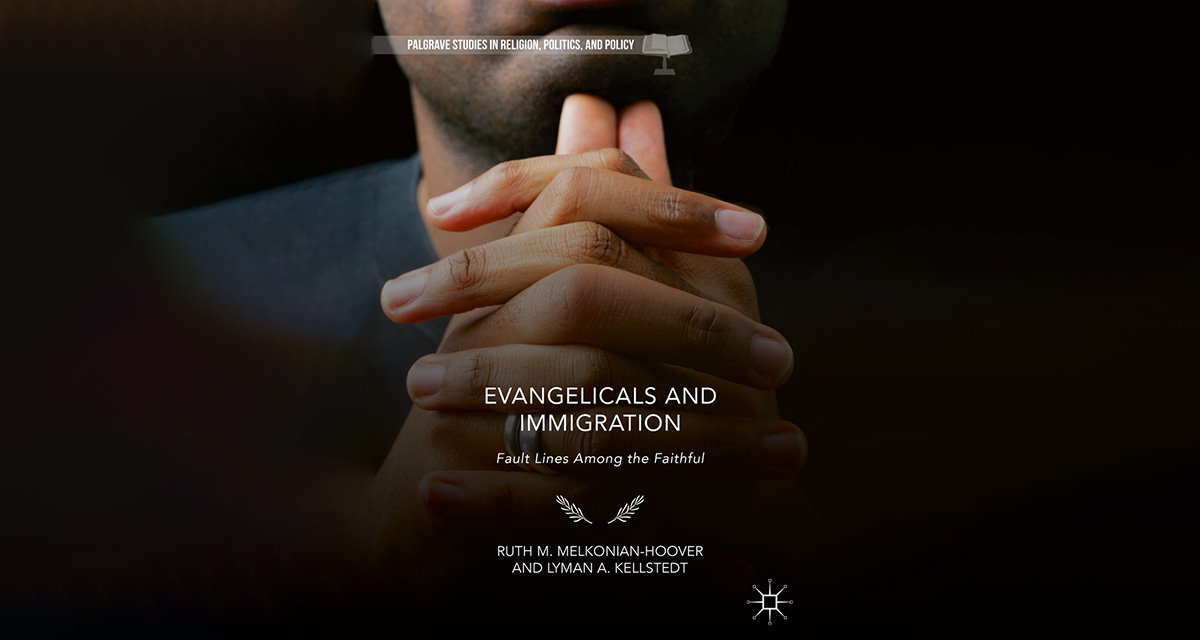Melkonian-Hoover Addresses Immigration Conversation Among Evangelicals in New Book
Sometimes the smallest requests deserve big answers—and sometimes it’s a 189-page answer. When Dr. Ruth Melkonian-Hoover (political science) was asked to write about immigration reform from a perspective of faith by James Skillen of Center for Public Justice in 2006, she uncovered “a bit of a mystery” that would define much of her work for the next decade. In her new book, Evangelicals and Immigration: Fault Lines Among the Faithful, released on November 14, she hopes to shed some light on the work she has done since then.
Comprised of analysis of extensive interviews, church data and public opinion data, the book—co-authored by Wheaton College Professor Emeritus of Political Science Lyman Kellstedt—provides one of the first balanced analyses of the role of religion in shaping historical and contemporary perspectives on immigrants, immigration and immigration policy.

But the process of obtaining evangelical responses to immigration and immigration policy, Melkonian-Hoover says, proved a difficult task. “You know where it is often complicated to secure interviews? Churches,” she says, observing a tentativeness in congregations due to the increased tension between serving immigrants and remaining nonpartisan.
Concerns are validated as churches face resistance when joining the conversation on immigration. “Pastors don’t want to scare people away,” she says. “There are consequences.” In one case, the congregation of a megachurch reportedly lost 400 members after the topic was addressed in a serious manner though it rebounded soon thereafter. Another church met aggressive opposition and protest for 14 months because of their efforts to help local immigrants.
Alternatively, some churches that had been dwindling grew into vital congregations upon working with immigrants, part of their community’s changing population.
Through her research, Melkonian-Hoover realized a need for more Christian voices in the immigration dialogue. Some in the media, she says, tend to solely reference a few outspoken conservative evangelical voices who do not represent the full array of evangelical leaders.
Listening to evangelical voices ranging from the conservative Southern Baptist Convention’s Ethics & Religious Liberty Commission, to the National Association of Evangelicals, to the National Hispanic Christian Leadership Conference to the more liberal Sojourners, she was encouraged to hear leaders were willing to come together and agree upon foundational principles in spite of some differences on policy implications. Many come together through coalitions like the Evangelical Immigration Table—and this despite the consequences experienced by some Christian leaders addressing immigration.
Given the immediacy of the conversation over immigration, Melkonian-Hoover and her co-author felt the time was right to use their years of research to contribute to the conversation. The final edits occurred just as stories of family separation at the border hit the news. Melkonian-Hoover says she hopes her book is used to support the conversation on just and merciful immigration law and reform.
“I hope Evangelicals and Immigration furthers constructive dialogue on immigration,” she says. “For example, I hope pastors get a perspective on the history, on what their parishioners may be thinking, on where there is common ground and on where their parishioners’ greatest concerns and hopes are.”
Despite years of conducting research and given her own experience as the daughter of immigrants, Melkonian-Hoover, chair of the Political Science Department, hesitates to call herself an immigration expert because of how much she continues to learn on a very complicated issue that touches upon so many areas. “There is always more to be done,” she says. With that sentiment in mind, she is already looking toward her next sabbatical to continue interviewing tough-to-crack demographics.
Evangelicals and Immigration: Fault Lines Among the Faithful is available for purchase by distributors including Amazon, Target, and Palgrave Macmillan.
 The Bell
The Bell